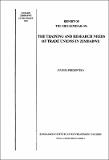| dc.contributor.author | Raftopoulos, Brian | |
| dc.coverage.spatial | Zimbabwe. | en |
| dc.date.accessioned | 2015-12-15T12:45:21Z | |
| dc.date.available | 2015-12-15T12:45:21Z | |
| dc.date.issued | 1983-12 | |
| dc.identifier.citation | Raftopoulos,B. (1983) The relevance of the National Manpower Survey (NMS) for the Labour movement, Report of the ZIDS Seminar on: The Training and Research Needs Of Trade Unions in Zimbabwe, pp. 20-31. Harare: Zimbabwe Institute of Development Studies. | en |
| dc.identifier.uri | https://opendocs.ids.ac.uk/opendocs/handle/20.500.12413/7221 | |
| dc.description | A conference paper critiquing the relevance of the National manpower Survey (NMS) conducted in Zimbabwe in the early 1980's. Originally presented at the ZIDS Seminar on: The Training and Research Needs Of Trade Unions in Zimbabwe, Harare, Zimbabwe, 5-9th December, 1983 | en |
| dc.description.abstract | At one level the relevance of the National Manpower Survey (henceforth referred to as NMS) for the labour movement in Zimbabwe can be measured by the somewhat hysterical response it elicited from the business Press in the country. On 26 August 1983 the Financial Gazette printed a Comment provocatively entitled "The Product of Pseudo Experts", referring of course to Volume I of the NMS. While the Comment conceded the existence of a wealth of statistical material in the NMS, it demurred that the latter was nevertheless "somewhat schizophrenic in nature". The schizophrenia, it appeared, stemmed from the dichotomy between the objective assessment of the past and present in statistical terms, and the interpretation of this past in the "Introduction" of the NMS which, according to the Comment, was "no more than political and racial polemics". Thus, the Comment proclaimed:
The basic underlying theme is correct. Black Zimbabweans have been denied access to skills on a consistent basis, dictated by the unacceptable racial attitudes of past governments. But the manner in which these facts and the recommendations are presented indicates a desire to maintain, or even heighten, a conflict with the alternative to Marxism.
While it was safe to merely empirically record the overt characteristics of the problem, it was nothing more than "political and racial polemics" to question the basic workings of the exploitative system which generated those characteristics. | en |
| dc.language.iso | en | en |
| dc.publisher | Institute of Development Studies Zimbabwe (ZIDS) | en |
| dc.relation.ispartofseries | ZIDS Special Paper Series.;Paper no. 4. | |
| dc.rights.uri | http://creativecommons.org/licenses/by-nc-nd/3.0/ | en |
| dc.subject | Population | en |
| dc.subject | Work and Labour | en |
| dc.title | The relevance of the National Manpower Survey (NMS) for the Labour movement | en |
| dc.type | Conference paper | en |
| dc.type | Series paper (non-IDS) | en |
| dc.rights.holder | University of Zimbabwe (UZ) | en |


